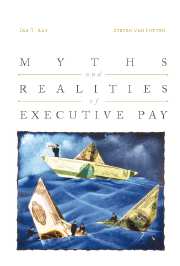Book contents
- Frontmatter
- Contents
- Acknowledgments
- Prologue: The Compensation Committee Meets
- Introduction: The Battle over Executive Compensation
- 1 The Myths and Realities of Pay-for-Performance
- 2 Managerial Power
- 3 External Pressures: The New Context for Executive Compensation
- 4 End of an Era: The Decline of the Stock Option
- 5 The Future of Long-Term Incentives
- 6 Executive Stock Ownership: The Solution to the Executive Compensation Crisis
- 7 Director Compensation in the New Environment
- 8 The Compensation Committee: Creating a Balance between Shareholders and Executives
- 9 Aligning All Employee Pay to Improve Corporate Performance
- 10 International Executive Pay Comparisons
- Conclusion: The Future of Executive Compensation
- Epilogue: Back in the Boardroom
- Appendix A Legal and Regulatory Requirements for Executive Compensation Plans
- Appendix B Summary of the Regulatory and Institutional Mandates and Recommendations
- Appendix C Academic Articles on Pay-for-Performance and the Effectiveness of the Executive Labor Market
- Notes
- Index
2 - Managerial Power
Published online by Cambridge University Press: 31 July 2009
- Frontmatter
- Contents
- Acknowledgments
- Prologue: The Compensation Committee Meets
- Introduction: The Battle over Executive Compensation
- 1 The Myths and Realities of Pay-for-Performance
- 2 Managerial Power
- 3 External Pressures: The New Context for Executive Compensation
- 4 End of an Era: The Decline of the Stock Option
- 5 The Future of Long-Term Incentives
- 6 Executive Stock Ownership: The Solution to the Executive Compensation Crisis
- 7 Director Compensation in the New Environment
- 8 The Compensation Committee: Creating a Balance between Shareholders and Executives
- 9 Aligning All Employee Pay to Improve Corporate Performance
- 10 International Executive Pay Comparisons
- Conclusion: The Future of Executive Compensation
- Epilogue: Back in the Boardroom
- Appendix A Legal and Regulatory Requirements for Executive Compensation Plans
- Appendix B Summary of the Regulatory and Institutional Mandates and Recommendations
- Appendix C Academic Articles on Pay-for-Performance and the Effectiveness of the Executive Labor Market
- Notes
- Index
Summary
Ultimately, though, [Bebchuk and Fried's] managerial power view is both problematic as a theoretical matter, and too simplistic to explain executive pay practices.
Kevin J. Murphy, Marshall School of Business, University of Southern CaliforniaManagerial power describes a corporate governance structure in which executives hold sway over a capitulating board of directors, usurping its decision-making power for their own benefit. Many executive pay critics now cast managerial power as the dominant force in determining executive pay. Those who argue that the pay-for-performance model is broken or nonexistent frequently turn to the concept of managerial power as the cause of the breakdown and the best explanation for the excessive levels of executive compensation that they believe must be corrected.
The corporate scandals of recent years fueled the mythology of corrupt CEOs and passive boards, with shareholders and employees left powerless in the face of widespread abuse. These scandals are terrible for the surviving corporations, the economy, and the morale of the investing public. But there is no evidence that they are the tip of an iceberg of out-of-control CEOs setting their own pay. A number of factors, mostly economic, influence the CEO pay market; managerial power is only one of them. In rare cases, it is the most important.
The most persuasive argument for the myth appears in Lucien Bebchuk and Jesse Fried's Pay without Performance: The Unfulfilled Promise of Executive Compensation, published in 2004.
- Type
- Chapter
- Information
- Myths and Realities of Executive Pay , pp. 28 - 46Publisher: Cambridge University PressPrint publication year: 2007



